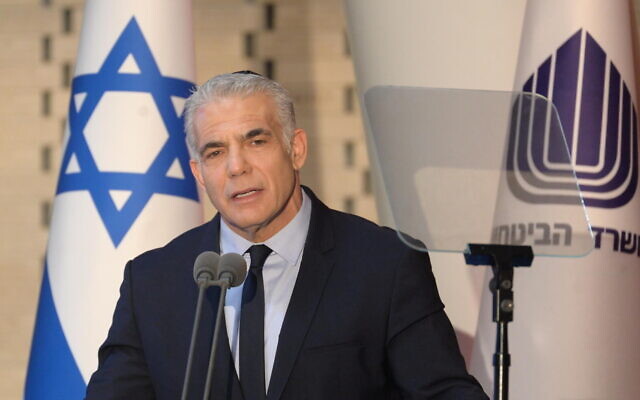Lapid instructs negotiators to turn down ‘significant’ new demands, warns Hezbollah that any attack would end talks permanently; Netanyahu takes credit for Israel’s stance
<
>

Prime Minister Yair Lapid addresses the state ceremony for 1973’s Yom Kippur War fallen, at Mount Herzl military cemetery on October 6, 2022 (Amos Ben Gershom / GPO)
Prime Minister Yair Lapid rejected on Thursday Lebanon’s requested modifications to a proposed maritime border deal, according to a senior Israeli official. Contradicting earlier assertions by Western officials that Lebanon’s objections were minor, the official called Beirut’s demands “significant.”
The statement cast doubt on the viability of a deal that, only days ago, Israeli officials were speaking of as a foregone conclusion.
Lapid also emphasized that he would not compromise on Israel’s economic and security interests even if it meant that there would be no deal in the near term, according to the official.
The official also warned the Lebanon-based Hezbollah terror group against trying to strike the Karish offshore gas field or threaten Israel, saying the talks would “end permanently, and [the terror group’s leader] Hassan Nasrallah will have to explain to Lebanese civilians why they don’t have gas rigs or an economic future.”
Over the weekend, the Biden administration’s energy envoy Amos Hochstein presented what was seen as the final proposal aimed at addressing competing claims over offshore gas fields in the Mediterranean Sea, which initially seemed to be welcomed by both sides.
Earlier Thursday, Lebanon’s caretaker prime minister said the deal with Israel would avert a war in the Middle East.
“We are avoiding a definite war in the region,” Najib Mikati said he told Maronite Patriarch Bechara Boutros Al-Rahi during a meeting in Bkerké. “When we unite and our decision is one, we can reach what we all want.”<
>
Later Thursday, Israel’s high-level security cabinet is set to convene to discuss the terms of the US-proposed deal for a maritime border with Lebanon.
Likud leader Benjamin Netanyahu claimed credit for Lapid rejecting Lebanon’s requested modifications to the proposed maritime border deal.
“Only intense pressure from myself and my friends has caused him to back away from this surrender agreement, for now,” tweeted Netanyahu, the opposition leader. Netanyahu, who has strongly criticized the proposed, but as yet unpublished deal, is hoping to return to the prime minister’s seat in coming November 1 elections.
Earlier this week, Mikati said that the position of Lebanon’s three senior leaders — himself, President Michel Aoun, and Parliament Speaker Nabih Berri — was unified.
Lebanon on Tuesday sent Washington its remarks on the proposal. No official details were provided on the contents of the Lebanese position.
Deputy parliament speaker Elias Bou Saab said the issue was “now in the hands of the US mediator,” adding that the response included “modifications” to the US proposal.”
“We are still cautiously optimistic,” a European diplomat told The Times of Israel.
“This is certainly a blow to a rapid closure of the negotiation but we don’t think it marks the death of it…yet,” said the diplomat. “Both sides have shown their interest in finding a middle ground in the last weeks, and it would be a pity to witness the failure of negotiations given [the] recent progress.”

Lebanese protesters sail near an Israeli Navy vessel during a demonstration demanding Lebanon’s right to disputed maritime oil and gas fields, near Naqoura, Lebanon, September 4, 2022. (AP Photo/ Mohammed Zaatari)<
>
<
>
An unidentified Western diplomat had told Walla news Wednesday that “Lebanon’s comments on the draft deal are constructive and do not include ‘poison pills’ that could prevent an agreement.”
Citing unnamed government officials Tuesday, the pro-Hezbollah daily Al-Akhbar reported that Beirut did not agree to recognize Israel’s buoy-marked boundary — which Jerusalem unilaterally placed five kilometers off of the coast of the northern town of Rosh Hanikra in 2000 — as an international border.
The report claimed Beirut was also against the idea of demarcating a land border as part of the agreement, and insisted that the issue must instead be reserved for discussions with the United Nations.
Furthermore, it said Beirut wants the French Total Energy company to work with Lebanon independently from its work with Israel, likely taking issue with the reported compensation Israel will receive from energy companies in exchange for giving up rights to the Qana offshore gas field.
Finally, Lebanon reportedly objected to a proposed signing ceremony alongside Israeli officials in the Lebanese city of Naqoura. Instead, officials countered that a deal should be signed with officials from the two sides in separate rooms, since Israel and Lebanon do not have any diplomatic relations and are technically at war.
Although full details of the agreement have not been made public, diplomats familiar with the matter say that the proposal recognizes Israel’s buoy-marked border, and after that, the border will follow the southern edge of the disputed area known as Line 23.<
>
The deal is said to allow Lebanon to enjoy the economic benefits of the area north of Line 23, including the Qana gas field, while Israel will remain in control of the Karish gas field.
The deal has come under fire from opposition leader Benjamin Netanyahu, who labeled the agreement “illegal” and accused Lapid on Monday of giving up “sovereign territory of Israel,” vowing that a potential future coalition led by him “won’t be bound by it.”
Last month, Lapid’s office vowed Israel would go ahead and extract gas from Karish with or without any final deal on the maritime border dispute.
Jacob Magid contributed to this report.



Leave a Reply
You must be logged in to post a comment.